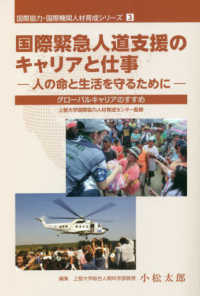- ホーム
- > 洋書
- > 英文書
- > History / World
Full Description
As a field of research, settler colonial studies has developed dynamically in recent years. This volume contributes a set of much-needed empirical analyses of the microhistory and practices of settler colonialism. Incorporating six case studies from across the Anglo-world, including the United States, Australia, and South Africa, this book examines the roles different actors played in this process, their individual experiences, and the social and physical (re-)organization of settler colonial space. They reconstruct the complexities of settler responses to Indigenous resistance, guided by fear or religious convictions; and explore the settlers' potential to manoeuvre on higher political levels, legitimizing frontier violence as a patriotic duty to the common good. In addition, they examine the production and circulation of knowledge about land, and discuss the ways in which socio-ecological systems were manipulated by stock farmers whose success depended upon an effective integration into a world-wide economic system. Overall, the volume presents a unique combination of microhistorical analysis and environmental history. This book was originally published as a special issue of Settler Colonial Studies.
Contents
Introduction - Experiences, actors, spaces: dimensions of settler colonialism in transnational perspective 1. Good land-bad land: ecological knowledge and the settling of the old Northwest, 1755-1805 2. 'The intrusion therefore of cattle is by itself sufficient to produce the extirpation of the native race': social ecological systems and ecocide in conflicts between Hunter-Gatherers and commercial stock farmers in Australia 3. Invariably genocide? When hunter-gatherers and commercial stock farmers clash 4. Poor, white, and useful: settlers in their petitions to US Congress, 1817-1841 5. 'I am frightened out of my life': Black War, white fear 6. Arms & amelioration: negotiating Quaker peace testimony and settler violence in 1830s Van Diemen's Land







